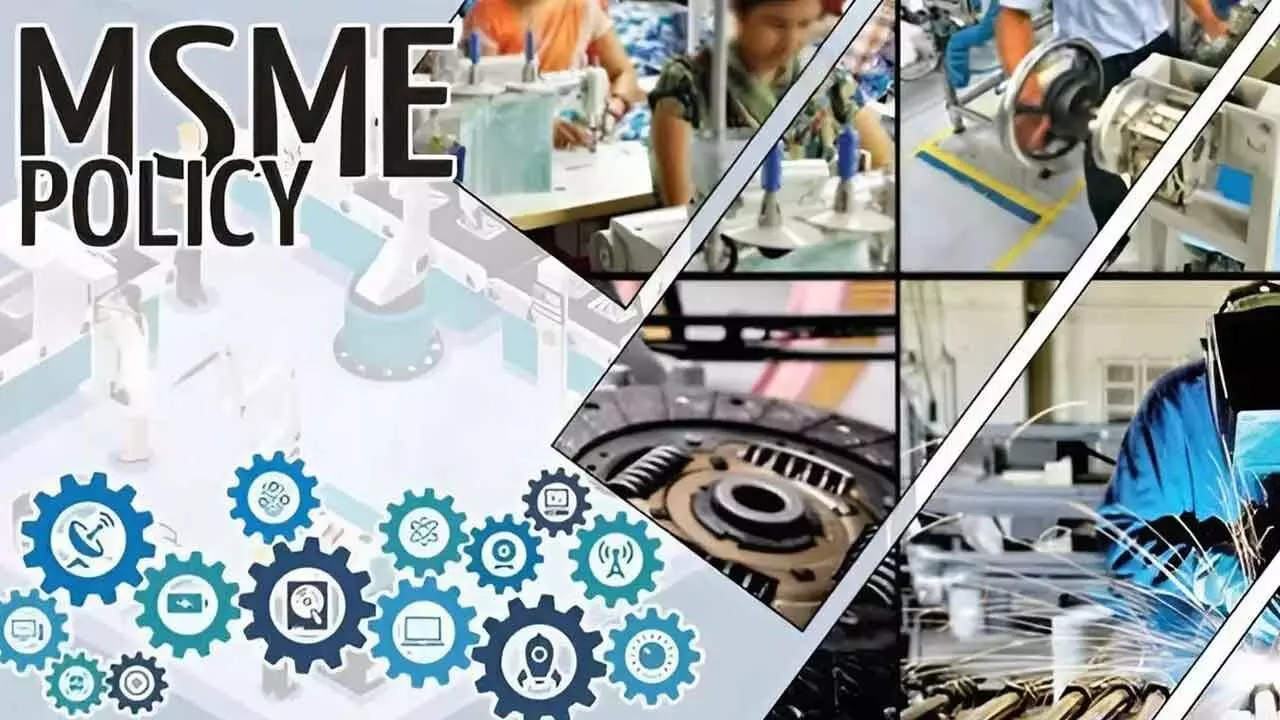Telangana Is Poised To Become A Robust MSME-Driven Economy
The average investments for an MSME have risen from `1 crore to `2.15 crore in six years
Telangana Is Poised To Become A Robust MSME-Driven Economy

The icing on the cake is in establishing an exclusive Telangana Skilling University. This will be a game changer as the sector will require many skilled and semi-skilled work force and the university will produce readily available trained products
The Micro, Small and Medium enterprises (MSMEs) have been the backbone of Indian economy. With more than 65 per cent of the country’s industry base coming from this sector, it contributes large volumes of export and employment. From land to capital to human resources to market, every aspect has been a challenge for this sector.
From June 2020, the threshold for the turnover for medium enterprises has increased to Rs. 250 crore.
Taking into account the ground-realities and how the sector has evolved over the years, the Telangana government, in its bid to propel the sector, has come up with a notable ‘Telangana MSME Policy 2024’.
The average investments for an MSME have more than doubled from Rs. one crore to Rs. 2.15 crore in the last six years and there has been 10-15 per cent growth in the registration of new units. The good thing about the policy is that it is very dynamic and forward looking.
The policy will work on six thrust areas of land, finance, labour, market access, raw materials and technology adoption. The government has earmarked Rs. 600 crore for the next five years.
Most of the MSMEs start small and the policy gives an impetus to make flatted factories, which will help them to start in an organic way. It is woman-centric and motivates women Self Help Groups to start their own units through these factories. One can expect a more Lijjat Pappad kind of models coming out from Telangana State.
From common pooling of resources to set up common testing facilities and making it easy to access finance, the policy talks about how these will be implemented in phased manner. The new addition is the leasing of land and sheds to MSMEs for a period of 30 years on recovery of upfront lease premium and on further extension. The positive side of the policy is to also strengthen the much needed infrastructure support in terms of warehousing and storage systems, setting up common testing facilities and logistics by creating raw materials directory and seamless supply for smooth operations.
The catchy part is that the government will carry out a comprehensive study on the need for technology upgrade for all MSMEs in the state. This will help to analyse the white spaces and then connect the dots to see how best the know-how and technology is adopted with spending on R&D, more connect with research institutes and helping them to become more digital and adopting IOT practices.
A dedicated fund for technology upgrade will be created along with support for filing patents. While this is good, the policy should have brought about innovation clusters in MSMEs in order to identify a set of MSMEs which are innovating products and services and build a separate MSME innovation park which would have helped making ideation to action faster. The financial support for patents could have been a maximum of Rs. five lakh for domestic patents and Rs. 10 lakh for international patent. The need will be to get the right technology at the right time for a perfect fit and penetration in the market.
The policy could have looked at more renewable energy companies and tech-driven companies with separate lens and provided add on benefits to encourage innovations in these sectors. Market and commercialisation have always been a setback for MSMEs especially with finding markets, faster access and realisation of payments. It is in this specific front that the policy will help MSMEs by encouraging large industries to procure their needs from MSMEs by co-branding their products with government stamping. This is a welcome step as it will open more avenues. Another area that needs to be addressed is the digital and ecommerce presence as their low digital footprints have been a roadblock in the past.
The icing on the cake is in establishing an exclusive Telangana Skilling University. This will be a game changer as the sector will require many skilled and semi-skilled work force and the university will produce readily available trained products, including students with dexterity in manufacturing and advanced technologies.
The new policy has all the ingredients to make it a robust MSME-driven economy provided the governance and enforcement of the six thrust areas happen as envisioned by the state. The announcement of incentives for SC and ST entrepreneurs will help in the expansion of MSME units in the state.
Overall, any policy brings with it a lot of hope and to make this hope, all stakeholders need to play their role and make Telangana a MSME role-model State by 2028.
(The writer is Head (Legal & IPR) Resolute Group of Companies)

